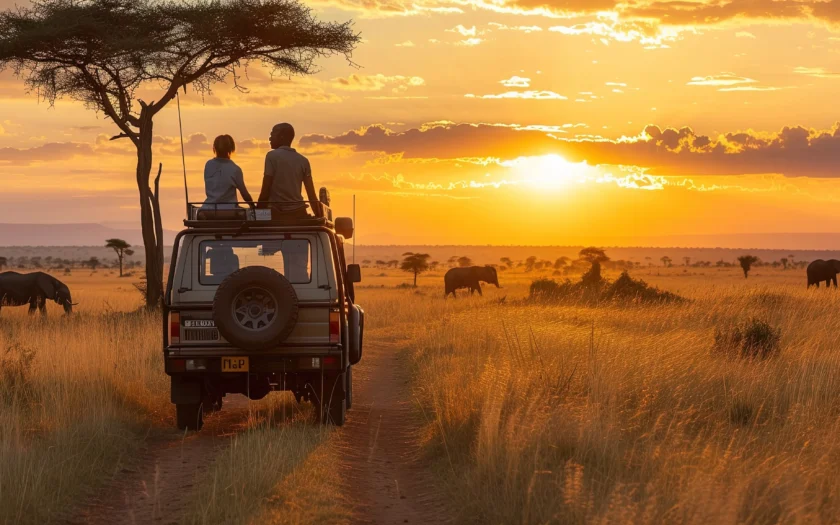An African safari is a journey, typically undertaken in countries across the African continent, to observe and experience the region’s diverse wildlife and landscapes in their natural habitats. Safaris offer travelers the opportunity to encounter iconic African animals such as lions, elephants, giraffes, rhinoceroses, leopards, and various species of antelope, among many others, in their native environments.
Safaris can take various forms, including game drives in specially equipped vehicles, walking safaris led by experienced guides, boat safaris along rivers and waterways, and even hot air balloon rides over vast savannas and grasslands. Beyond wildlife viewing, safaris often include opportunities to interact with local cultures, learn about conservation efforts, and enjoy the breathtaking scenery that Africa has to offer. It’s an immersive and unforgettable experience that allows travelers to connect with nature and gain a deeper appreciation for the beauty and biodiversity of the African continent.
Benefits of an African Safari
Embarking on an African safari offers a plethora of benefits that encompass both personal enrichment and conservation efforts. Here are some key advantages:
- Unforgettable Experiences. African safaris provide unparalleled opportunities to witness iconic wildlife in their natural habitats. From observing majestic lions on a hunt to encountering massive herds of elephants or witnessing the great wildebeest migration, the experiences gained are unforgettable and often life-changing.
- Connection with Nature. Safari experiences immerse travelers in the beauty and tranquility of Africa’s wilderness. Being surrounded by stunning landscapes, from expansive savannas to lush forests and winding rivers, fosters a profound connection with nature and a sense of appreciation for the natural world.
- Cultural Immersion. Many safaris offer opportunities to interact with local communities and learn about their traditions, customs, and way of life. This cultural exchange enriches travelers’ understanding of the diverse cultures across Africa and fosters mutual respect and appreciation.
- Education and Awareness. Safaris are educational experiences that provide insights into wildlife behavior, ecology, and conservation. Knowledgeable guides share information about the flora and fauna encountered, conservation challenges facing the region, and the importance of protecting Africa’s biodiversity for future generations.
- Support for Conservation. Participating in safari tourism directly contributes to conservation efforts in Africa. Revenue generated from safari fees often funds wildlife protection initiatives, habitat preservation, and community development projects, helping to safeguard endangered species and their habitats.
- Adventure and Relaxation. African safaris offer a perfect blend of adventure and relaxation. Whether embarking on game drives, bush walks, or cultural excursions during the day, or unwinding in luxury lodges or tented camps nestled in the wilderness, travelers can tailor their safari experience to suit their preferences and interests.
- Personal Growth and Reflection. The immersive nature of safaris encourages personal growth and self-reflection. Disconnecting from the hustle and bustle of daily life and spending time in nature allows travelers to recharge, gain perspective, and cultivate a sense of inner peace and well-being.
Overall, an African safari offers a multifaceted experience that combines adventure, education, conservation, and cultural immersion, making it a truly enriching and rewarding journey for travelers of all ages and backgrounds.
What do travelers need to know about safari?
As you can probably imagine, there is a lot to learn and prepare for before you set out on your trip to ensure that your first safari lives up to your expectations. Luckily for you, we’re here to help.
How to choose a safari?
If you have already started surfing the Internet in search of different safari holidays, then, apparently, you are familiar with a slight feeling of dizziness and confusion from the abundance of options and the multitude of options that are offered.
We understand perfectly well that making a choice from such a range of offers is, to put it mildly, problematic and can even be overwhelming. So to narrow down your choices, we recommend that you create a list of your top 5 “must haves” on a safari. This list should include the most important things to consider for your trip, such as your budget, what you’d like to see and do, your preferred type of accommodation, and transportation method.
You can start creating a list by asking yourself the main reasons why you want to go on safari. Is it because you would like to see certain types of animals? Or would you like to watch the migration of animals with your own eyes? Or do you want to take part in a project to preserve African wildlife?
By having a clear understanding of why you want to go on safari, and having your priorities straight, you can better focus your search and easily eliminate options that don’t fit your needs and preferences on the list.
Where to go?
Africa is a huge continent, each country of which has its own unique nature, wildlife and cultural heritage. Based on data disseminated by Africa Renewal Online (a magazine published by the UN), of the 50 million tourists traveling to Africa each year, the largest share are travelers from France, the UK and the US. However, each of them has different preferences. French travelers prefer to choose Morocco, Tunisia, Mauritius and Senegal. The British prefer Egypt, South Africa, Mauritius and Gambia. While South Africa, Tanzania, Ghana, Rwanda, Ethiopia and Zimbabwe are favorites among US tourists. If you decide to go on a safari for the first time, it makes sense to start with proven and popular safari regions in Africa. Additionally, you can also easily determine your destination based on what species of animals you expect to see during your trip.
What to see?
Understanding what you can expect to experience on your safari adventure is an important part of planning your own version of the perfect safari. Although Africa is rich in wildlife, it is worth noting that many species are unique only to certain regions.
For example, the Big Five safaris are popular among safari newbies. These safaris are specifically designed for travelers whose main goal is to see the Big Five animals: lions, leopard, rhinoceros, elephants and African buffalo. If you are one of those, then you should go to Botswana, Zambia, Namibia, South Africa, Kenya, Tanzania, Zimbabwe, Congo or Malawi.
However, if you are interested in gorillas, then Uganda, Rwanda and Congo should be high on your list of best places.
When to go?
When it comes to safari, the best time to go depends on your chosen destination. Generally, it is best to go during the dry season, as due to water shortages, animals tend to congregate around several water sources to quench their thirst. Dirt roads are also more accessible (during the rainy season, some areas may be flooded, making travel difficult). That’s why you’ll be able to see so many more animals than you might expect. This also has its downside. Since the dry season is considered the peak season for safari, it most likely comes with a higher price. If you expect to see animals migrating, be sure to consider the time of year. For example, in Serengeti National Park the great migration occurs during the dry season (late June to September).
Who can you see on an African safari?
Embarking on an African safari offers the opportunity to encounter a diverse array of wildlife species in their natural habitats. Some of the iconic animals you may see on an African safari include:
- Big Cats. Lions, leopards, cheetahs, and African wildcats are among the big cats that roam the savannas and grasslands of Africa. These majestic predators are often a highlight of safari experiences.
- Elephants. African elephants, both savanna and forest species, are the largest land animals on Earth. Safaris provide opportunities to observe these gentle giants as they forage, socialize, and interact with their surroundings.
- Giraffes. Towering over the African plains, giraffes are easily recognizable by their long necks and distinctive coat patterns. Observing these graceful creatures as they browse on acacia trees is a memorable safari experience.
- Rhinos. Both black rhinos and white rhinos inhabit certain regions of Africa. Despite their large size, rhinos can be elusive, but safari-goers may be lucky enough to spot them grazing or wallowing in mud.
- Buffaloes. African buffaloes, also known as Cape buffaloes, are formidable herbivores found in grasslands and woodlands across Africa. They often travel in large herds and are a common sight on safaris.
- Antelopes. Africa is home to numerous antelope species, including impalas, kudus, elands, gazelles, and wildebeests. These graceful herbivores can be seen grazing or engaging in courtship displays during mating season.
- Hippos and Crocodiles. Rivers and waterways in Africa are inhabited by hippos and Nile crocodiles. Safaris may include boat trips or river cruises, providing opportunities to observe these aquatic species from a safe distance.
- Birds. Africa boasts a rich diversity of birdlife, with thousands of species inhabiting various habitats, including wetlands, forests, and savannas. Birdwatchers on safari may spot colorful species such as African fish eagles, lilac-breasted rollers, and ostriches.
These are just a few examples of the incredible wildlife you can encounter on an African safari. The specific species you see will depend on the region and ecosystem you visit, as well as factors such as the time of year and local wildlife populations.
How to avoid getting hurt during a safari?
While safaris offer incredible opportunities to experience wildlife in their natural habitats, it’s essential to prioritize safety to ensure a memorable and incident-free experience. Here are some tips to avoid getting hurt during a safari:
- Follow Guide Instructions: Always listen to and follow the instructions of your safari guide or ranger. They are trained professionals who understand the behavior of wildlife and know how to navigate safely in their presence.
- Stay in Vehicles: When on game drives or wildlife viewing excursions, remain inside designated vehicles at all times, unless instructed otherwise by your guide. Vehicles provide a safe barrier between you and potentially dangerous animals.
- Maintain Distance: Respect wildlife and maintain a safe distance from animals. Do not approach or attempt to feed wild animals, as this can provoke defensive or aggressive behavior.
- Avoid Sudden Movements: Make slow and deliberate movements to avoid startling animals. Sudden movements or loud noises can alarm wildlife and may result in unpredictable reactions.
- Be Mindful of Surroundings: Pay attention to your surroundings and stay aware of wildlife activity. Look out for signs of animal presence, such as tracks, sounds, or visual sightings, and heed any warnings from your guide.
- Use Caution Around Water: Be cautious around bodies of water, as they may be inhabited by hippos or crocodiles. Keep a safe distance from water’s edge and avoid swimming in areas where wildlife is present.
- Protect Against Insects: Insect bites and stings can pose health risks in certain safari destinations. Use insect repellent, wear long sleeves and pants, and consider using mosquito nets or screens in sleeping areas to prevent bites.
- Stay Hydrated and Sun-Safe: Safaris often take place in hot and sunny climates. Stay hydrated by drinking plenty of water, wear sunscreen, hats, and sunglasses, and seek shade during the hottest parts of the day to prevent sunburn and dehydration.
- Pack Essential Medications: Bring along any necessary medications, such as antimalarials or allergy medications, and ensure you have access to medical facilities or emergency assistance if needed.
- Respect Local Customs and Regulations: Familiarize yourself with local customs, regulations, and wildlife protection laws in the areas you visit. Respect wildlife habitats and refrain from engaging in activities that may harm or disrupt the natural environment.
By following these safety guidelines and exercising caution, you can enjoy a safe and enjoyable safari experience while appreciating the beauty and wonder of Africa’s wildlife and landscapes.



